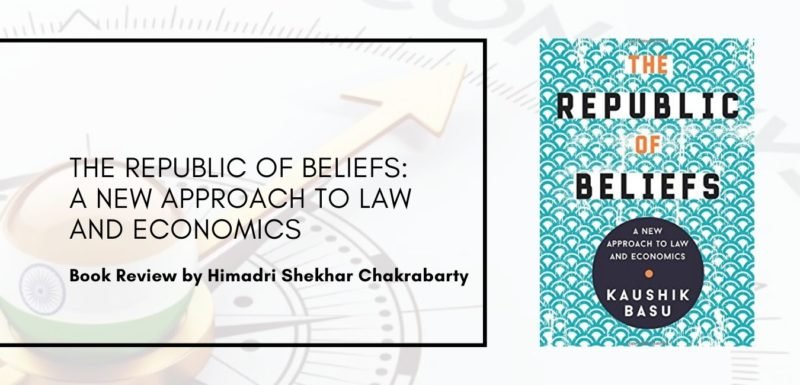The Republic of Beliefs: A New Approach to Law and Economics | Book Review

The conjunction of Economic Theory and Law has often helped to deconstruct some of the nuances of societal behaviour. The hypothesis governing the relationship has earlier been studied through positive or normative economic approaches of law. The positive approach posits that law is the result of an effort to induce efficient economic outcomes and the normative relates legal intervention with market failure. Kaushik Basu*, who has been a distinguished economic theorist, makes an attempt to study the relationship between Law and Economics through a more modern functional approach where the focus has been to understand societal realties through the choices, actions and interactions of independent individual decision-makers. Titled “The Republic of Beliefs”, the book tries to unfurl the “fault-lines” in the context of conventional Law and Economics and presents an alternative view of effectiveness and enforcement of the law through the prism of Game Theory. The book has been lucidly written to address the concerns of any “lay reader” interspersed with a game-theoretic representation of social realities. The uniqueness of the book lies in the minimal use of mathematical symbols in much of the models and that the entire book can be studied without referring to the past Game theory literature.
One of the most salient concepts of Game Theory used by the author to establish why most of the laws remain as “ink on paper” has been that of the “focal point” introduced first by an American economist Thomas Schelling. The focal point is automatic coordination of beliefs among individuals resulting in the coordination of behaviour. The author points out that “What matters are my beliefs and my beliefs about other’s beliefs, and other’s beliefs about my beliefs” which ultimately makes the law powerful, thus elucidating the rationale of the book’s title-“The Republic of Beliefs”. The author has made preliminary attempts in understanding why the law in spite of being powerful is often violated and gives the wherewithal for better “implementation of the law” by sharing some subtle examples and experiences. This book is an off-shoot of the rampant corruption and law violations that Basu observed while serving as the Chief Economic Advisor for the Government of India between 2009-12, encouraging him to analyse it wearing an academician’s hat.
The author dissociates himself from giving a “formal definition of law” and instead prefers the circular way of defining it by stating that “a law-abiding society is one where members of the society abide by the law”. However, multiple instances have been cited by the author where the abiding has given way to abatement of written law like in the case of bribing for receiving driver’s license or the acute leakages in the public distribution system of food in India due to the ration-shops in India appropriating profits by selling the allotted share in the market at higher rates. Blaming the massive grain leakage on the “design” rather than “intention” of law, the author argues for direct transfer of food subsidies in the form of vouchers, stamps or cash to the people below the poverty line. However, the author does not clarify whether the received subsidy amount would actually be used for the required purpose and not be spent on illicit activities.
This mechanism suggested by the author never punishes the guilty ration shops but rather goes for an alternative solution. As far as bribing is concerned, the author opines that India’s Prevention of Corruption Act, 1988 should be amended such that only the bribe taker is held guilty and the bribe giver let scot-free assuming that the latter goes to play the role of a whistle-blower, which prevents the action of bribe-taking in the first place. Though the argument seems logical on the reasoning of “backward induction”, it is highly unlikely that a poor individual will dare to play the role of whistle-blower especially when he will take into account the already existing corruption that engulfs the society.
The author takes on the neo-classical view of law and economics which states that “the chance of being caught is small, but, if caught, the penalty is hefty” by claiming that a penalty component shall naturally invite the crime of bribery making it an elongated chain of law violations. Using the acclaimed Prisoner’s Dilemma analogy, the author states that the “invisible hand” hypothesis leads to a socially sub-optimal outcome requiring the intervention of the law. According to him, the neo-classical idea “to use the law to deflect society to a better outcome” is “internally flawed” as the paper-written or digital jottings of law would not make a difference to any culpable action by individuals with or without them. Thus, on the one hand, Basu interprets the law-making phenomenon as costless from the point of view of consequences which he calls as “cheap talk”. However, the time and effort that goes into the framing of the law is akin to “burning of money” as it hardly affects the outcomes of decision making. The anomaly in the status-quo arises because there is an implicit assumption that the enforcers of the law are like “robots” and necessarily perform what the law postulates.
Instead, the author connects the “focal point approach” in explaining the obedience to the law. The author explains this through a very simple example where he states two people deciding to meet at a place may be left confused by the vagueness of the exact spot of meeting. But if a “focal point” is created by putting up a signboard “Meeting point”, the identification hassle is reduced. His basic premise lies in the fact that when individuals recognize the social pressures based on their beliefs, the law is adhered to which the author terms as “socially self-enforcing mechanism”. The advantage of focal point approach is that it engages all the players of the game including the functionary or the enforcers of law and the citizens who are being enforced on making the “beliefs” more fool-proof. This is precisely where social norms and law are different from each other where unlike law, norms represent the patterns of behaviour without the need for any external “functionary” enforcement. However, a law enforced is not necessarily implemented as reasoned by the author using the tool of focal point approach. Firstly, the assumption that law always leads to equilibrium is faulty as it could be in the interest of at least one person to behave differently from the rest. Secondly, the multitude of laws creates ambiguity and contradictions making it difficult to establish the focal points. Thirdly, the focal point could vary across different groups of people if the signals of the law are identified by one group while ignored by the other.
Professor Basu suggests that there is a “thin line” of difference to distinguish the social outcomes caused due to the exogenous act of law and by endogenous processes such as culture, norms and customs. Through an example, he states that law enforcement or the lack of it need not necessarily curb freedom of speech as it can also be significantly affected by “social pressure, ostracism and punitive action across ordinary individuals.” These are what he refers to as “informal social controls” which can be restrictive even sans law. He relates these endogenous measures with reasons for the persistence of social evils like untouchability and boycott of unjust political leaders. One of the key running themes across all these discussions around the law is that he recognizes the “malleability” of human preferences. This is a departure from the concept of “rational individuals with given preferences” and the author tries to marry the upcoming field of Behavioural Economics with Law. However, what is unclear is if the law in itself is necessarily rational and whether there exists any yardstick for measuring it.
Though the book promises to be a collection of many thought-provoking anecdotes, it fails to concretely establish any meaningful answers to the recurrent societal issues relating to law and economics. The author certainly unfolds the significance of beliefs in law but by diminishing the importance of written rules, thus putting the legal profession itself into jeopardy. The book does not distinguish the impact of beliefs separately on violation of criminal and civil laws which could have alternative effects. The continuous use of the celebrated Nash Equilibrium to model the beliefs is certainly useful from a researcher’s perspective. But the law which is highly dependent on “precedence” might not necessarily be represented by a concept which hardly factors in past behaviour and overlooks the innate assumption that the choices of the individual players of the game cannot be independent of the other. Moreover, much of the book has been written keeping the Indian perspective of law violation in mind. It overlooks the comparative analysis with better law-abiding regions like Singapore and why the beliefs of the ordinary citizens are so different at different regions. As far as the structure of the book is concerned, it is slightly repetitive in some of the chapters where the “focal point approach” has been elucidated through different examples. The last few chapters of the book seem slightly detached from the heart of the book’s discussions and focus on a more generic framework of the issues plaguing the economy. However, what is commendable across the book is the humility with which Professor Kaushik Basu has questioned the fundamental assumptions of law and yet conceded that they might “not provide final answers but the groundwork”.
* Kaushik Basu is the Professor of Economics and the C. Marks is Professor of International Studies at Cornell University. He has also served as the senior vice-president and Chief Economist of the World Bank part from serving as the Chief Economic Advisor to the Government of India


















